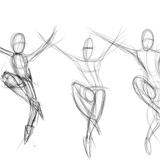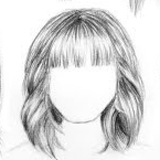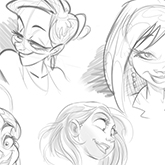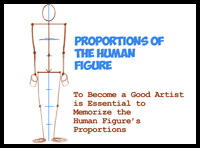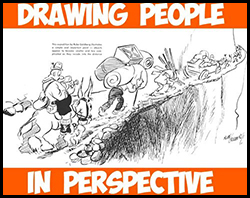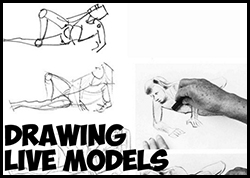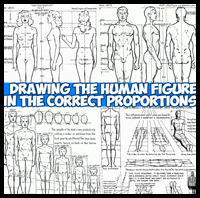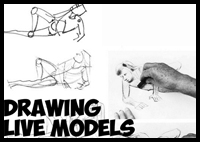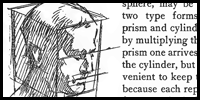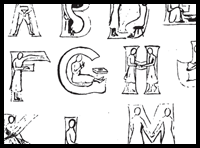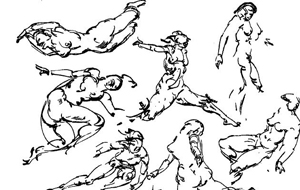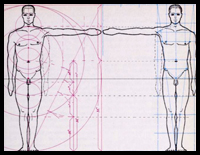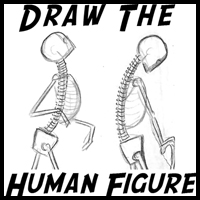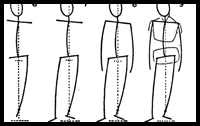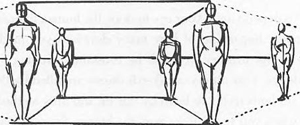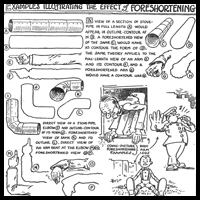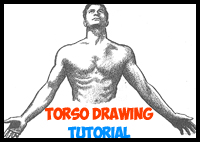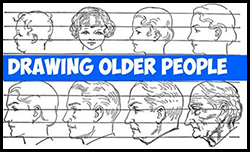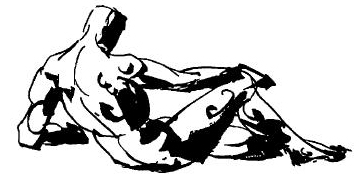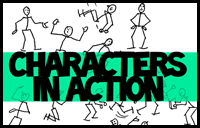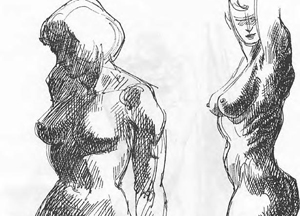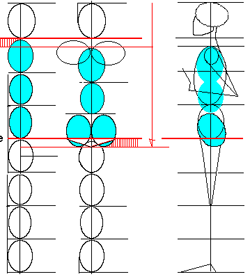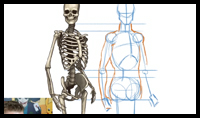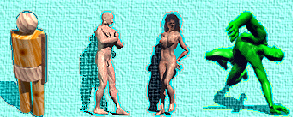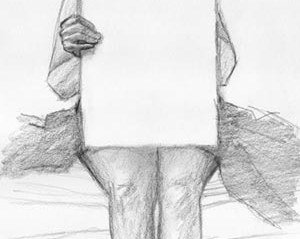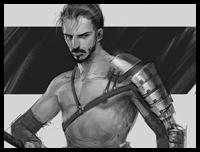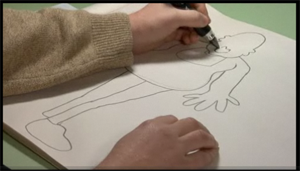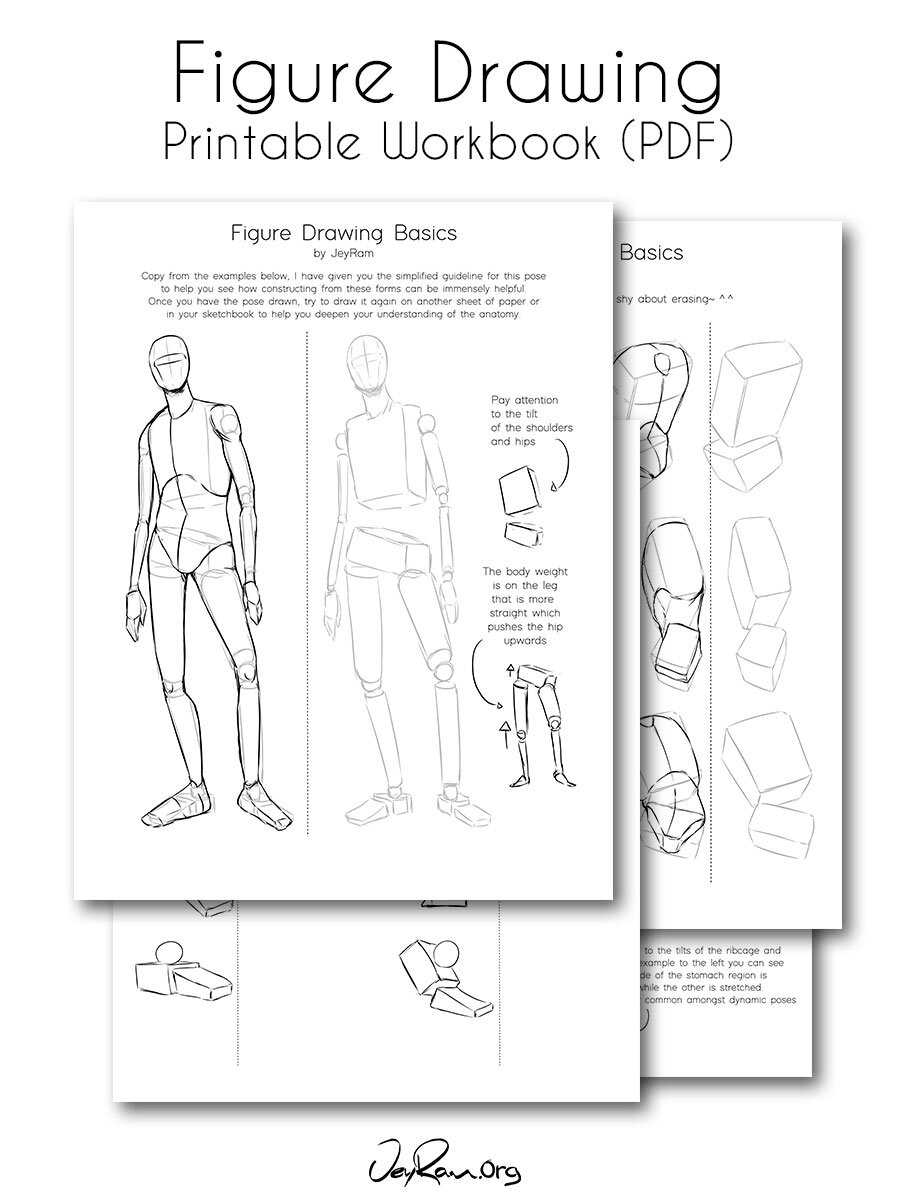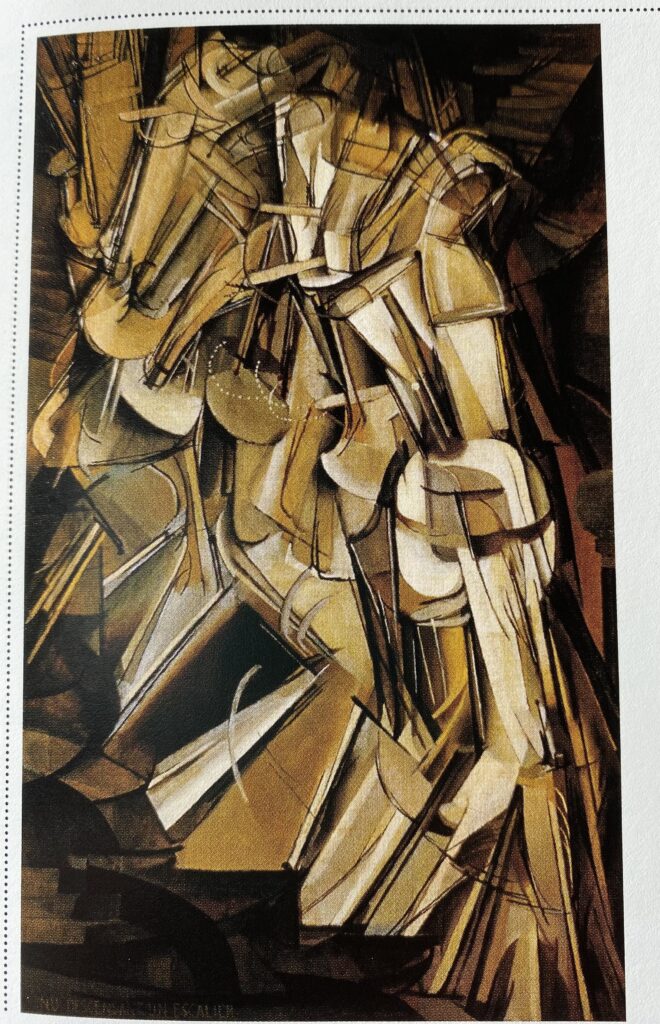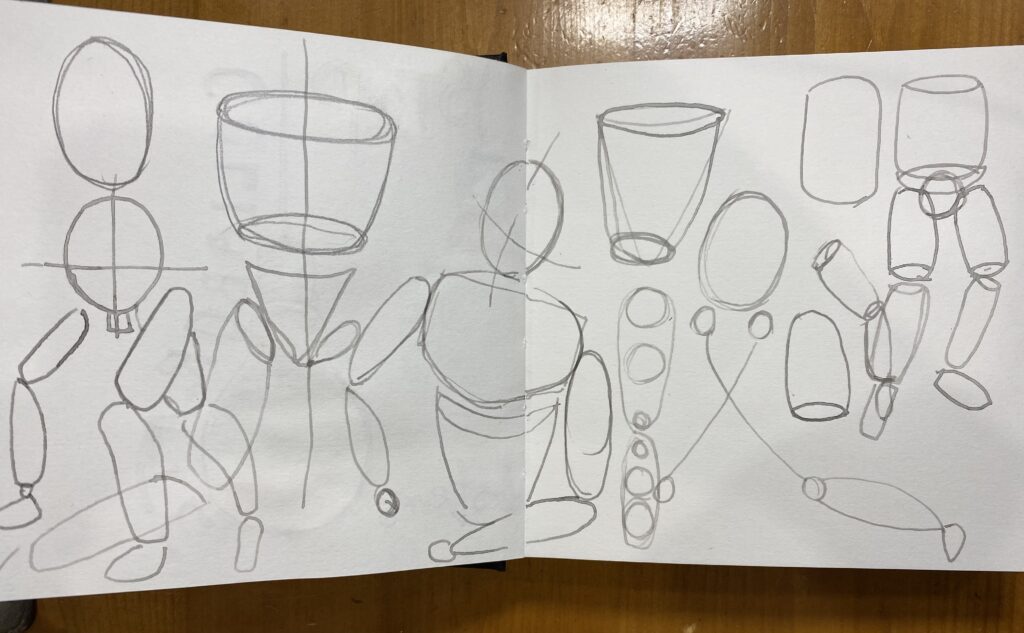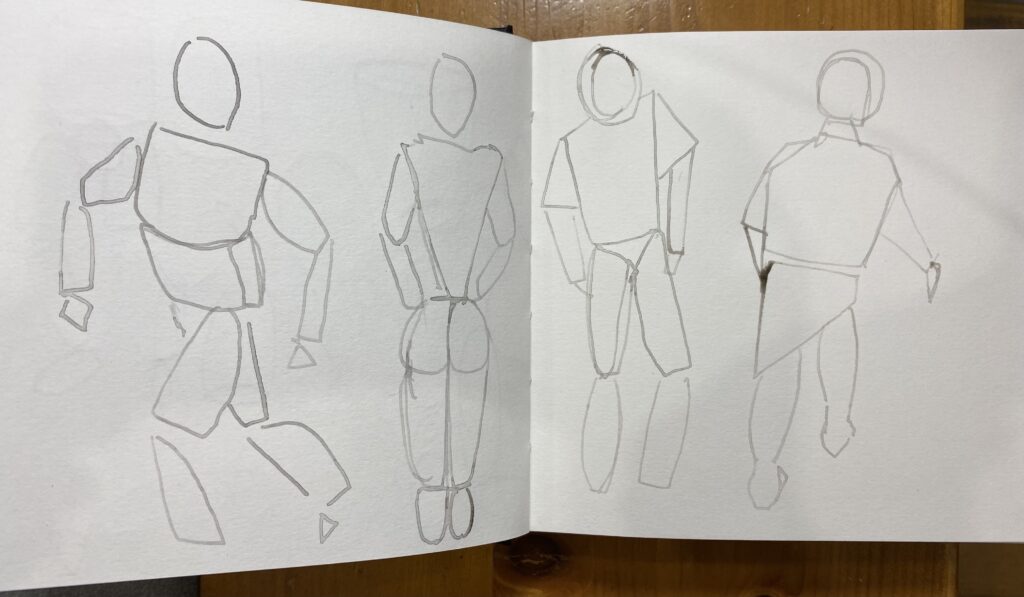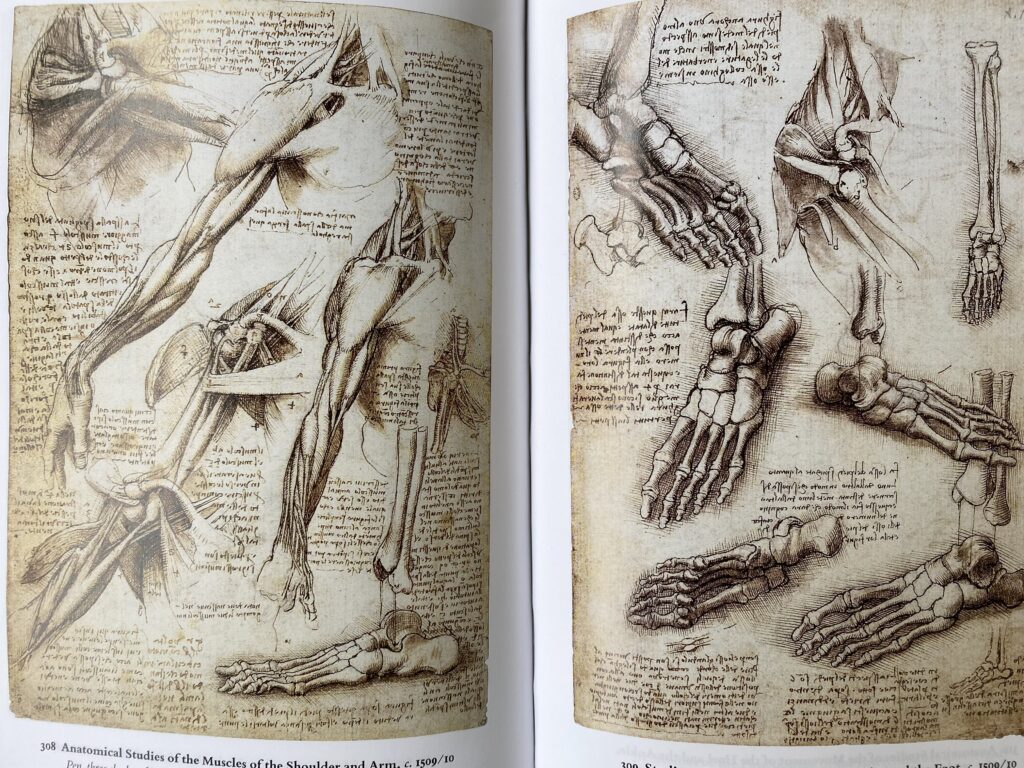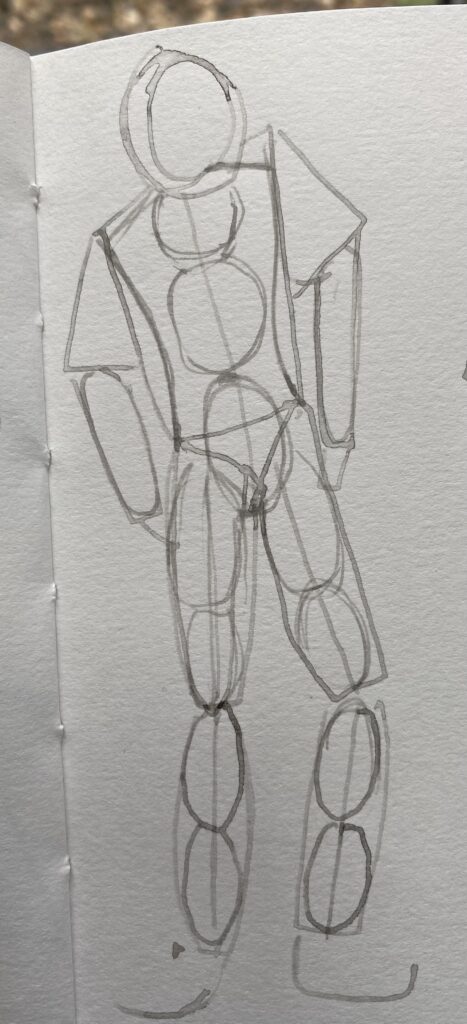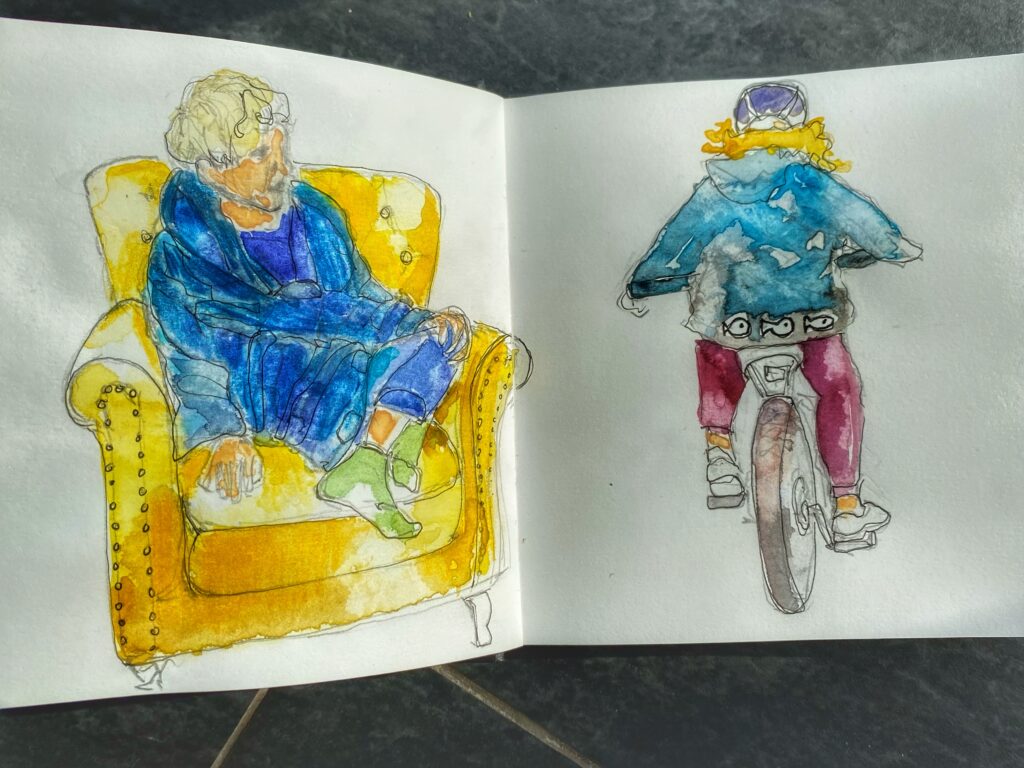How to draw human
How to draw human
How to Draw People
If you want to learn how to draw people, you may search for a tutorial that will teach you everything you need. Unfortunately, this is not possible—drawing human characters is a very complex topic, composed of many smaller topics like gesture, anatomy, details, facial expressions, techniques, and others.
So instead of creating one huge tutorial that would be too big to swallow, I gathered different tutorials all in one place so that you can try them one by one, learning all the necessary elements at your own pace.
Figure Drawing Tutorials
The biggest difference between human characters and artificial objects is that the former are alive and moving, creating various poses depending on their action, personality, and mood. This is something you should start your drawing with, because even the most anatomically realistic human will look like a doll or a sculpture if you miss the gesture.
In drawing, a gesture is a set of basic, nicely flowing lines that define the pose of the character without including any details. A good gesture drawing should show the energy and action of the character, without actually showing the character itself. That’s why you should learn it first, and only then focus on more detailed things like the actual muscles.
Human Anatomy Fundamentals: Learning to See and Draw Energy
What is the energy of a human pose? In this tutorial you will learn how to see it in people around you and how to capture it with quick sketches.
Quick Tip: Create Dynamic Poses Using Gesture Drawing
In this short tutorial, you will learn all the basics of drawing gestures—perfect for an introduction to this subject!
Human Anatomy Fundamentals: Basic Body Proportions
Proportions are the key to correct anatomy. Without good proportions, even the most realistic muscles will not make your characters look realistic. In this tutorial, you will learn what proportions you must use to create a convincing human silhouette.
Human Anatomy Fundamentals: Balance and Movement
Humans don’t move their body parts in a random way—there are certain rules that lead to specific kinds of motion, and once you learn them, you’ll be able to draw realistic poses for your characters.
Human Anatomy Fundamentals: Flexibility and Joint Limitations
Bones define the proportions of the body, and joints limit the motion of each bone. You must learn these limits to create natural poses for every action you need.
How to Draw a Stick Figure: a Complex Guide
This is not a joke! You can learn all the basics of human proportions and poses just by drawing slightly developed stick figures. It’s a fun and educational tutorial that you will love even if you don’t believe in your skills at all!
Dynamic Gesture Drawing
If learning from videos is your thing, you should try this course to learn all about drawing dynamic gestures. These 15 lessons will help you really understand what’s it all about!
How to Draw Gesture – Step by Step
You may know how to draw gestures, but how exactly can you practice in order to become more efficient? In this article, Stan Prokopenko will explain his own tricks and exercises you can try.
Quickposes: Timed Practice
One of the most popular and effective ways of practicing gestures is to draw them during a timed exercise: optimally, 30 seconds for one photo. The limited amount of time forces you to focus on what’s crucial in the silhouette, helping you develop economical lines. This great site will help you with this exercise, showing you whole sets of various photos and counting the time for you.
CroquisCafe: Figure Drawing Resources
Proportions and gestures are best learned through practice—many, many sketches of various people in various poses. This library of high-quality resources will give you exactly the materials you need. It’s like a whole set of figure drawing lessons that you can attend without leaving your home!
5 Simple Tips for Improving Your Figure Drawing Skills
How do real artists practice figure drawing? You can learn it from this article to make your own self-learning process more efficient and less chaotic
How to Draw Human Anatomy
Humans have bodies made of bones, ligaments, and muscles. You can’t ignore them all just because they’re hidden under the skin—the skin wouldn’t have any shape without them!
So learning what the muscles look like, where they are attached and what they do is crucial to creating realistic human bodies, especially if you want to be able to do it without a reference. Your knowledge of anatomy should be your own personal reference that you keep in your mind all the time!
Human Anatomy Fundamentals: Advanced Body Proportions
Humans are different, and while they all have similar proportions, certain deviations can and must be applied to create various characters. In this tutorial, you will learn how you can change the proportions while still staying on the realistic side.
Human Anatomy Fundamentals: Muscles and Other Body Mass
When someone says «anatomy», muscles are the first thing that comes to mind, and for a good reason: though hidden under the skin, they make the shape of the body. In this tutorial, you will learn how to draw them in a convincing way, without memorizing complex anatomy diagrams. Bonus part: you’ll learn about fat, too!
How to Draw Different Body Types for Males and Females
If you want to draw various characters, you need to learn all about achieving various silhouettes according to the rules of human anatomy. The more you know, the freer you’ll be as an artist!
Human Anatomy Fundamentals: Drawing Different Ages
There’s no «default» age for a human body—we change from birth to our last days. In this tutorial, you will learn what changes happen to our bodies during the aging process, so that you can create characters at various stages of their lives.
Human Anatomy Fundamentals: Additional Tips
When artists learn human anatomy, with time they discover certain tricks that come from the holistic knowledge of the human body. Here, our author Joumana Medlej will show you her tricks!
BioDigital: Human Visualization Platform
When you learn anatomy from various tutorials, you may find certain things confusing, as various authors simplify the subject in different ways. If you really want to learn advanced anatomy, you should go right to the source: for example, this amazing 3D model of a human. You can rotate it and remove muscles to see their full shape and how they connect to the bones. A free account is required to see the model.
Zygote Body: 3D Anatomy Viewer
This site offers a different model of anatomy, and it’s perfect if you find something confusing in the previous one—the comparison will help you understand what’s really going on. This model is also simpler to use, if you find BioDigital too complex.
GetBodySmart: Virtual Dissection
3D models of human anatomy are awesome, but sometimes they’re too much—sometimes you want to analyze the muscles in a more traditional way. This site has really helped me understand the individual muscles, explaining what wasn’t completely clear in the 3D models. These neat diagrams let you perform your personal dissection, with a focus on one area of the body at a time.
How to Draw a Head and Face
A human face is tricky to draw—we are extremely good at recognizing when something is wrong about the proportions. Unfortunately, we are not as good at pointing out exactly what is wrong and what has to be changed to make the face realistic. That’s why you should learn this topic very carefully. If you do it properly, you’ll be able to draw completely new, realistic faces from imagination!
Human Anatomy Fundamentals: Basics of the Face
Start with the basics—what are the proportions of the face? How do you rotate the head without losing them? You’ll solve the most popular beginner’s mistakes in this tutorial.
Human Anatomy Fundamentals: Advanced Facial Features
Ready for something more advanced? In this tutorial, you will learn how to give the face a unique look: how to apply gender, age, ethnicity, and other factors.
Human Anatomy Fundamentals: Mastering Facial Expressions
Humans are masters of facial expressions—we are capable of showing so many emotions! This comprehensive guide will show you how to capture them all, in both subtle and exaggerated ways.
Quick Tip: How to Draw Facial Expressions to Show Emotion
Do you need something simpler than the huge guide above? This short tutorial will quickly guide you through the basics of emotions.
Human Anatomy Fundamentals: Drawing Characters Consistently
If you want to create a comic story, you need to be able to draw your characters consistently, and this is not easy! In this tutorial, you will learn how to master this skill.
The Differences Between Male and Female Portraits
How to Draw Lips and a Mouth
If you want to draw realistic lips on your characters, you need to understand how they work. In this tutorial, you will learn the anatomy behind the look of lips, which will help you draw them in every pose and shape.
How to Draw a Nose
Noses can add a lot of character to a human face, but to draw a nose properly, you need to understand its construction first. In this tutorial, you will learn the anatomy of the nose, as well as how to simplify and rotate it.
How to Draw Ears
You can try to hide the ears under the hair, but there will come a time, sooner or later, when you’ll have to leave them bare. Learn how to draw them and you’ll never have to make your haircuts conform to them! This tutorial includes both anatomy and step-by-step instructions.
DOs & DON’Ts: How to Draw Realistic Hair Easy for Beginners Step by Step
Hair may seem intuitive to draw at first, but it’s really not. In this video, you’ll learn what mistakes beginners make when drawing hair and how to avoid them.
How to Draw the Head and Face / Portrait with Steve Huston
Even if you can’t afford art school, it doesn’t mean you can’t attend real, professional classes. This 3-hour video with an expert is free and available to anyone!
How to Draw the Head From Any Angle
Even after you learn all the proportions and features of the face, it can be very hard to keep them correct on a rotated head. In this tutorial, you’ll learn a useful method to draw the head in any view.
How to Draw Hair Step by Step
In this tutorial, you will learn how to draw various basic haircuts in a simple way. Perfect for beginners!
How to Draw a Realistic Eye
A human eye is a great subject to draw—if you do it correctly, you have a beautiful drawing standing out right on its own, without having to draw the rest of the face. In this tutorial, you’ll learn how to draw a fully realistic eye step by step.
Observations and Tips for Drawing Realistic Eyes
How can you draw realistic eyes all the time? Why are they so tricky, and what mistakes do beginners usually make? You’ll learn it all from this article.
What You Need to Consider When Drawing Hairstyles From Scratch
Hairstyles are tricky, but only when you keep guessing instead of learning! This tutorial will give you a good foundation for all your drawn haircuts.
Line of Action: Face & Expression Practice
Practice makes progress, so if you want to make progress in drawing facial expressions, you need to draw a lot of them. This site will help you by providing a timed exercise with a whole library of references.
How to Draw Hands and Feet
Time for the biggest nightmare of artists: drawing hands and feet. But there’s no need to be afraid—they’re only scary when you don’t know how to draw them, and these tutorials will help you with that. From anatomy to poses and details, they have all you need. You’ll never have to hide the hands behind the back again!
Human Anatomy Fundamentals: How to Draw Hands
In this tutorial, you will learn the anatomy of hands, how to simplify them, and what to do to make them look natural. You’ll also learn about poses and various shapes of hands.
Human Anatomy Fundamentals: How to Draw Feet
Here, you’ll start with anatomy to understand the construction of human feet, and then you’ll learn how to simplify them with special tricks. You’ll also learn how to solve popular problems that lead to unnatural feet and toes.
How to Draw Hand Bones – Anatomy for Artists
It can be very useful for an artist to think of hands as a category of a skeleton. If you learn how to draw them this way, you’ll never have problems with creating natural poses again in any view!
How to Draw HANDS – Details for Realistic Hands!
But hands are not only bones, and their look is not only about the correct pose. In this tutorial, you will learn certain details that make hands realistic.
How to Draw Feet with Structure – Foot Bone Anatomy
Seeing the bones inside the feet makes drawing them so much easier! In this tutorial, you will learn how to simplify the anatomy of the foot to a special construction, easy to memorize and replicate.
Quick Tip: How to Draw a Hand Based on Geometric Shapes
Do you want to draw a hand quickly, without focusing too much on anatomy? This tutorial is just for you!
Line of Action: Hands & Feet Practice
Even if you understand all the theory behind correct hands and feet, nothing beats proper, regular practice. This site will give you a chance to practice drawing hands and feet in a timed exercise.
How to Draw Cartoon People
The cartoon style can be very appealing to beginners, because it offers clear, simple rules and a guarantee of achieving a neat end result—as long as you follow them. However, you shouldn’t think of cartoon drawings as something for children and not real artists. Art isn’t only about realism—art can be a great medium to express your vision, to communicate something, and if the cartoon style helps you do this more efficiently, then you shouldn’t feel ashamed to use it at all!
Our instructor Carlos Gomes Cabral prepared a whole series on how to draw in cartoon style, with a focus on drawing cartoon people.
Cartoon Fundamentals: How to Draw a Cartoon Face Correctly
Starting with the face can be a great, non-stressful exercise, as you only focus on one part of the body. And you can have so much fun with all the variety of facial features and expressions!
Cartoon Fundamentals: Create Emotions From Simple Changes in the Face
Speaking of expressions, in this tutorial you will learn how to create them in a simple yet effective way.
Cartoon Fundamentals: How to Draw a Cartoon Body
Drawing a whole cartoon body is not much harder than drawing the face, once you know the way. As a bonus, you can learn how to draw cartoon animal bodies, too!
Cartoon Fundamentals: How to Create Movement and Action
You can’t tell a story without using some action! In this tutorial, you will learn how to add movement to your characters.
Cartoon Fundamentals: How to Draw Cartoon Hands
Hands can be so tricky to draw, but they’re a very important element of expressing emotions for cartoon characters. In this tutorial, you will learn how to draw cartoon hands in both simple and dynamic angles.
Cartoon Fundamentals: How to Draw the Female Form
When you learn how to draw cartoon characters, often you’re only being shown male ones. In this tutorial, you can learn about the specific features of a female/feminine body to achieve a better variety in your characters.
Cartoon Fundamentals: How to Draw Children
Children are not simply adults on a smaller scale. They have their own special proportions, and in the cartoon style they’re supposed to be exaggerated! In this tutorial, you will learn how to do just that.
How to Draw a Chibi
While it’s not actually a cartoon style tutorial, it’s just as simple—and it gives you so many possibilities to create your own character!
How to Animate People
Animation is nothing but creating a lot of drawings with little changes between them. So once you know how to draw people, it takes just a little step to learn how to animate them! These tutorials will help you take this step painlessly.
Animation for Beginners: How to Animate a Head Turn
How to make the head turn in a smooth way? This tutorial will teach you just that!
How to Animate a Character Throwing a Ball
Action is what animation is all about. Here you’ll learn how to create such an action on an example of a character throwing a ball.
Animation for Beginners: How to Animate a Character Walking
It’s one of the most popular animation exercises: learn how to make your character walk to the side.
Animation for Beginners: How to Animate a Character Walking From the Front View
Drawing walking towards the viewer is much harder than drawing the side walk, because there’s perspective involved. But with this tutorial you’ll learn how to do it in no time!
Animation for Beginners: How to Animate a Character Running
Running is a very dynamic motion that can let you employ extreme poses of your character. Learn from this tutorial how to do it properly.
How to Animate Flowing Hair in Toon Boom
In this fun tutorial you’ll learn how to create a simple yet realistic animation of flowing hair.
Drawing Techniques
But drawing is not only about what—it’s also about how. What tools should you be using for your drawn people? What techniques do you need to use? These tutorials will show you a mix of techniques for various tools and topics.
How to Shade for Complete Beginners
Start with the basics: how to hold the pencil and how to move it to create various shades.
How to Shade & Pencil Shading Techniques
This tutorial will teach you all about shading with pencils—how light and shadow work, how to use different pencils, how to shade smoothly, how to keep the right pressure, and much more!
How to Create a Tonal Portrait Using Pencils
You can create a nice portrait using a black and a white pencil on a toned paper. This tutorial will show you how!
How to Draw a Long-Haired Character Portrait With Color Pencils
If you have some color pencils, you can try this tutorial to learn how to draw beautiful flowing hair.
How to Create a Medieval-Style Female Profile With Ink and Pencils
You can create beautiful things with some ink, as long as you know how to use it. This tutorial will make you familiar with drawing a portrait this way.
How to Draw a Soft, Dreamy, Profile Illustration With Color Pencils
Realism is not the only way to create art. In this tutorial, you’ll learn a very special, soft way of shading with color pencils that leads to a unique style.
How to Create a Hand-Drawn Pointillism Portrait
Pointillism is the technique of drawing a whole drawing just with dots instead of lines. If you have problems with lines, or drawing with pencils in general, this may be something you need!
How to Sketch the Human Body With Charcoal
Using charcoal for drawing human figures has been very popular among professional artists and art students for years. In this tutorial, you can learn how to do it on your own!
Conclusion
To sum it up, the skill of drawing people can be divided into many sub-skills:
So if it’s hard for you to draw a realistic person, don’t worry—it’s just harder than it looks! I hope this set of tutorials will help you find and overcome your issues with drawing people. Remember, practice makes progress—but only if you know what you’re practicing!
And if you’re tired of studying such a complex subject, but still want to draw something fun, you can check our easy tutorials that don’t require so much dedication. Just follow the steps to get a beautiful end result!
How to Draw a Human
Do you want to learn how to draw a human? If so, then with this super simple instruction, you can learn how to draw a human easy and very quick!
Step 1
So, start with the skeleton, depicting the head, chest, and pelvis in the form of simple ovals. Connect them using the line of the spine. The height of the torso together with the neck should be approximately equal to the height of the sum of three heads.
Step 2
Now let’s depict the limbs. This must be done using simple lines. Depict the joints using small circles. Legs should be slightly longer than arms.
Step 3
Two intersecting lines on the head will help us further to depict the face most correctly and symmetrically. Then connect the head to the torso with a cylindrical neck and create a torso by connecting the chest and pelvis.
Step 4
Now let’s depict the arms. Start by sketching the shoulder and elbow joints. Then depict the upper and lower arms. At the same stage, depict the palms, as did the artists of Easydrawingart.com.
Step 5
Now do the same, but with the legs. As before, create knees using balls. Then depict the upper and lower legs. Do not forget to depict the feet.
Step 6
In this stage, we will need the very lines that we depicted in the third stage. Start with the eyes, then portray the nose and mouth. Do not forget to create the eyebrows.
Step 7
Using the U-shaped line, depict the jaw. You can depict this part of the head as artists of Easydrawingart.com did, or give the jaw a different shape. Depict the ears on the sides of the head.
Step 8
Now is the time to depict the hair. You can give the hairstyle a look as in the example depicted by the artists of Easydrawingart.com, or come up with another hairstyle.
Step 9
Now gently trace the neck and shoulders. Next, depict the torso and add some folds to give the human drawing a bit of realism.
Step 10
Now gently trace the arms to create a muscle outline. In the same stage, you can depict the sleeves of the T-shirt. But of course, you can depict a shirt or other clothes.
Step 11
A fairly simple stage in which we will need to depict the hands. To do this, gently draw the fingers as the artists of Easydrawingart.com did in the sketch below this text.
Step 12
Using smooth lines, trace the legs and depict the jeans. Add some creases to the knees area and at the lower part of the jeans. Add pockets and fly.
Step 13
Now let’s portray the shoes. We decided to depict sneakers, but you can replace them with boots or other shoes.
Step 14
Now put the pencil aside and take an eraser to wipe off the auxiliary lines from the human drawing. Now take a darker pencil or ink and trace the artwork to make it more beautiful.
Step 15
Now take your favorite colors and paint the human. You can use the palette provided by the artists of the Easydrawingart.com or use your own colors. To make your artwork look more voluminous, add some shadows.
So, could you learn how to draw a human with this instruction? Write to us about this so that we know your opinion. We read all your comments and respond to many of them.
HOW TO DRAW PEOPLE & DRAWING HUMAN FIGURES & THE BODY
Learn how to draw people, their bodies / figures as great cartoons, comics, illustrations and photo-realistic art with these free drawing lessons. You Might Also Enjoy Our Drawing Tutorials for The Face and for Sketching Figures in Correct Proportions
HOW TO DRAW PEOPLE : FIGURE DRAWING
Learn how to draw better female figures with the following helpful methods and techniques. The following helpful pointers will help you learn how to draw attractive, lively girls and women figures. This particular tutorial is for drawing more interesting finished drawings by adding lines of actions and variety of lines within each figure drawing.
There are proportions of the body that you should memorize and always keep in the back of your mind…and once you do this, the human body isn’t so hard to draw at all. It is just these facts that should pull all everything together for you. Bookmark this page and come back to it for when you need it.
Do you want to learn how to draw the comic cartoon body? You will find it helpful to have methods and techniques to follow when drawing the human figure, so we have put together this tutorial to give you some routines to follow. With the application of a few simple rules, you will be able to create amazing cartoons and comics in no time flat. Today, I will be showing you a technique to draw a proportional cartoon figure from the front view.
Using perspective techniques will allow you to properly size things in relation to each other.
В
This lesson will guide you through the quick, stressful process of drawing a live models who keep changing poses.
The human figure is a mathematically beautiful piece of art in itself, find out what you can do to draw people in the correct proportions. This is a blurb from the book “Figure Drawing For All It’s Worth”…you can find it on Amazon if you like this.
Learn how to draw the human figure and their bodies by learning all about the human anatomy from the artistic stand-point.
This is a figure drawing lessons to help beginners learn how to draw people and their faces and bodies. this is a good tutorial for all amateur artists and kids.
Sketching a live model can be tough, it is a lot of pressure to work fast and to get all the details while staring at a live human being. It is also hard to get the right pose. This lesson will guide you through that process.
Drawing the Human Body and Its’ Forms by Comparing Body Parts to Different Geometric Shapes
With the following methods, children have been known to draw better than they have ever drawn…so read on.
How to draw people and human figures in action and movement, such as jumping, walking, twisting, and running. Learn how to draw and sketch people in action as great cartoons, illustrations and realistic drawings with these free drawing lessons.
Here is a blurb from an old book that sheds light on how artists use to figure out the correct measurements and proportions of the human body.
A good article on drawing a person’s body
Here you will find practical advice for drawing live models in a classroom setting or a studio setting.
Learn all about drawing in figures with perspective theory such as one point and two point perspective with the following drawing tutorial and guide.
Today we will show you how to draw or animate the human figure walking or running. This drawing lesson is perfect for the person who wants to make an animation of a person walking or running…or for the artist who needs references of walking figures.
Learn how to draw cartoon figures in the correct perspective by using foreshortening. The following drawing tutorial will guide you through drawing cartoon and comic figures / people in the correct perspective to improve your drawing style.
Learn how to draw a person’s chest and torso with the following drawing lesson. This tutorial will guide you through the process that artists use to draw the male and female torso.
Learn all about how to draw people and their figures with this drawing tutorial on searching for the human form.
Just a short page or 2 from an old book on drawing old people
How to draw people and the human figure with knowlege of Human Anatomy. Only when you try to learn how the human figure is constructed, does your ability to draw the human figure increase.
Learn how to draw people and their bodies. a lesson for beginners.
Today we will learn how to bring our cartoon people figures to life and put them in action. To put a figure in action we use a simple skeleton as a guide and foundation. Study each of these little sketches and notice how simple it is to suggest any particular action you want to by using these little figures.
Learn how you draw figures and shapes in motion and in action with the following drawing lesson and tutorial for drawing shapes in movement.
How to draw human chest and torso with male and female body and figure drawing lessons and step by step drawing pictorial tutorials to create great cartoons, illustrations, and comics.
Drawing The Human Figure in Correct Proportions.
Great tutorial on easily creating the human figure.
This site is devoted to better understanding of the elements that make up the human figure and how to better portray them. It is intended as a resource for artists and art students who work with the human form. This site focuses on accepted conventions of figure drawing that have been used to model the figure since antiquity.
Figure drawing strategies for artists who want to draw the nude (or nude-ish) human figure but don’t have a model.
Sharp explains how to nail those tricky proportions in your figure drawing.
Gesture drawing is the process of drawing the human figure quickly and loosely. Gesture drawing is done to accurately capture the pose of a figure quickly. It is not about creating a finished drawing, but rather a drawing in which a finished painting or drawing can be developed. Gesture drawings can be accomplished by using a variety of lines, shapes, or entirely blocked-in figures.
Drawing the human body can take practice and skill. Get expert art tips for figure drawing in this free video art lesson on drawing people
Learning how to draw people really is a lot easier than you may think . This is true especially when it comes to drawing cartoon people, and when you start out with some very simple, basic techniques and then work your way up from there.
A little tutorial on how to draw people using boxes as reference. Using boxes its a good advice to start drawing: they make everthing a little easy. Everything has been drawn in Open Canvas and then recorded and edited with after effects.
A Very Nice tutorial Teaching how to draw different parts of body & then making them stick together. Step by Step & With illustration of all the steps. So learn & Start Drawing
A complete guide for drawing whole human body. Tutorial Contains Lessons on How to Draw, Hand, face, Eyes, Nose, Ears, Profile, Body, Mouth
Learn how to draw simplify torso and pelvis using geometric shape for Manga Anime comics: Step by Step video tutorial explain. Learn to sketch construction line for man and woman body
Drawing and rendering male body, man torso or upper body, chest, abs, ribcage and shoulder: front view character design, comics, manga, anime and video game concept art
One of the challenging things about drawing a characteristically female body is getting the proportions right. This article breaks the body down into eight sections, showing you where certain features begin and end.
I have a few people request doing a basic female body form so here it is. It’s just a basic model proportion sheet to practice basic female form for beginners. My advice is that it is not flattering drawing female figure as it is shown, it is a model sheets. And very BASIC.
Nice Tutorial with examples how to make female body
I am writing this tutorial as a learner myself so if you have never put pencil to paper before, do not despair because if I can do it I’m sure you can
You Might Also Enjoy Our Drawing Tutorials for Drawing the Face and for Drawing Figures in Correct Proportions
Your Custom Text Here
Anatomy Tutorials
Welcome to this series of drawing tutorials! Here we will simplify down the complex anatomy of the human figure into its most basic components. If you are new to drawing or want to improve really quickly I would recommend practicing the basic forms until they feel easy to draw.
You can check out my Basic Forms tutorial here
Learn the basic skills of drawing the human figure. in this 28 page workbook, we go over the simplified form of each element of the human body and then build more complex forms on top of that.
This method is great for drawing the human body from imagination and also from reference. I personally wish someone had taught me this method of drawing the figure which is why I designed these worksheets around this method of practice.
This workbook is also part of the Figure Drawing Bundle that you can grab here if you are interested in getting the whole collection!
Learn how to draw hands with this 21 page workbook that will walk you through the 4 stages of understanding how to draw hands from imagination.
Learning to draw can be frustrating and intimidating but with these worksheets, you will have a clear path forward and exercises to help you take things one step at a time!
This workbook is also part of the Figure Drawing Bundle that you can grab here if you are interested in getting the whole collection!
Patreon Membership
If you are interested in supporting the work that I am creating on a regular basis I have a Patreon that you can check out below! Patreon is a platform where you can provide creatives with monthly support to give them the stability to create on a regular basis, it’s like buying a friend a coffee on a regular basis.
The main point of becoming a member isn’t about receiving exclusive items (although that is part of it), it’s about a shift in how we think of creative work. Patronage used to be something that was only available to royalty and the ultra-wealthy, but with the internet that has all changed.
By becoming a patron of an artist, you are voting for the art that you think should exist and be created in the world.
Obviously this isn’t mandatory in any way but if you are interested you can check it out below!
A Guide to How to Draw a Human Figure
How to Draw a Human Figure?
It’s my nemesis to be honest. An ambition of mine is to be able to sketch human figures quickly in my sketchbook as I do with everything else.
With this thought in mind, I’m challenging myself (as well as you!) to break down the process of drawing a human figure. I want to understand what techniques and tools I need to adopt to be able to develop my own style in order to understand this challenging subject area.
I draw great comfort that I fall in line with the great artists over the centuries who have also struggled with this area of drawing. Van Gogh, for example, began his prolific art career drawing figures in static poses. During the first two years of his career he spent ALL of it mastering drawing. He struggled with problems of proportion as you can see from the drawing on the left below.
The head is drawn overly large as are the shoes and hands (a problem I affiliate with). Compare this earlier sketching rendition of the carpenter on the left (Carpenter, 1880. Rijksmuseum Kroller-Muller, Otterlo) with a sketch, two years later of an old man sitting in a chair (Old Man Reading 1882, Van Gogh Museum, Amsterdam) where he’d clearly mastered his proportion problems. It took him two years of practice! Perhaps, herein lies the first lesson to take forward on consistently practising. (I love uncovering the stories of the great artists by the way as it teaches us so much about the journey they undertook to get to the famous artworks we come to know, love and respect.)
Table of Contents
Why is drawing the human figure so difficult?
Drawing the human figure, in theory, should not be any less challenging than drawing anything else. All drawing is based on proportion. Landscapes, sketching objects or a still life, buildings and street scenes and humans! Drawing humans depends heavily on correct proportions – more so perhaps than other drawings.
For example, ever found human heads challenging to draw?! I do! Its baffling why this is so. In answer to why this is, we over emphasise the features, not the foreheads and hair because that is where our day to day focus lies when interacting with one another. We have to re-train our brains to understand the science of proportion in an un-emotive way. That is why you will often see me sketching the head last in my drawings! I need the rest of the body to gauge the size of the head.
So the first lesson for the beginner getting started drawing the human figure, has got to be a focus on simple shapes and then on proportion. The American artist, Burne Hogarth stated that
“There are three kinds of forms in the human figure: Ovoid forms – egg, ball and barrel masses; Column forms – cylinder, cone; Spatulate forms – box, slab and wedge blocks.” So true!
I will be exploring how to use simple shapes to get started and then use them to build an understanding of proportion.
My Guide on How to Draw A Human Figure In Three Simple Steps
The Stick Man
I am going to show you have to combine everything from scratch starting with the stick man I referenced from the onset of this post!
Yes. Believe it or not stick men and drawing them form an important part of learning how to draw the human figure. Especially if you are a beginner.
In 1912 the art world was outraged by a painting called “Nude Descending a Staircase” by a surrealist artist called Marcel DuChamp. I remember seeing this painting at the age of 19 and being equally affronted that something that looked like multiple cardboard men had become such a sensation, especially having come from studying the Renaissance painters and Masters on human shape and form. His semi abstract nude, however, had an extraordinary sense of movement. Duchamp shifted attention from art work per se and managed to capture the ideas that lay behind them. We can still tell that this is a human form and shape.
Why include this painting in this article and what does it have to do with stick men and drawing the human figure? To me this painting symbolises not only deconstructing the human anatomy but also stripping it right back to basic shapes. It is not particularly transcribed in an accurate way. The genius result, however, is that the nude descending is still recognisable as a human form.
The stick man for me is as basic as you can get. Everyone can draw a stick man and it is usually the most popular comment I hear “I can just about draw a stick man.”
Let’s start there then.
I’m going to show you how I use the stick man as my starting point and then build a representational human in the below video.
How to Build Your Stick man!
One of the first things I have noticed about drawing stick men is that you quickly define what type of human drawing you could finally produce. You could be representational with your stick man or more cartoon like. I seem to veer between the two in my sketchbooks. I like to get as close to accurate as I can and enjoy deconstructing an image in order to capture it.
If you feel artist’s block coming on from the thought of this idea, or you are a total beginner new to all of this, then pull out a magazine and draw the stick man shape you see on the page with a marker pen over a human figure. I show you how to do this in my online Sketch from Scratch course.
The important thing to note about drawing the human figure is you need to find ways to de-mystify it. Everyone develops a different approach and I’m sharing mine. In the video accompanying this article I run through a very basic 3 step approach. Take a human image. Use a photograph or magazine and then, looking at the picture visualise how you would draw a simple stick man shape to represent the drawing.
Start with a simple stick man as I have done
Try and give them something to do. Mine is getting into the water to swim. If you have more time, practice lots and lots of stick men drawings on the page. Doodle them on a page. Keep it simple. Play with them on a page over and over again. Draw a page of different stick men in different poses. Seriously. When I first started I would find my children’s comic books and bedtime stories and trace over the characters in them into stick man shapes. I was fascinated by the movement and shape and oddity of my stickmen. Importantly, however, it gave me a sense of movement and also short-circuited worrying about foreshortening or perspective. Major challenges we all face when drawing human beings.
“Fleshing” out your sketch
Remembering the points I made earlier on in this post, now start to fill out your stick man using shapes and blocks, remembering to add curves for the limbs and basic filled out shapes. Don’t worry that you are scribbling on or around the actual initial stick man. This exercise is all about getting you used to building layers around the stick man shape. Again as you familiarise yourself with step 2 of this process take some time simply quickly sketching shapes and form on a page. You may find that by the end of an exercise like this one you abandon needing to draw a stick man to help you.
Practice Mark Making
For those of you that have followed me for a while you will have seen me advocate mark making as part of your regular sketchbook habit.
Following on from the stick man phase, I have filled a page, as Burne Hogarth advocates, with spheres, triangles, circles and lines to practice.
Fill a page with shapes
Have a go simply filling a few pages with a variety of shapes. On a new page, then have a go putting some of these shapes together into a human body likeness as I have done below. Use reference photos of people. Practice drawing cylinders to support you start thinking in a 3D way. I’ve used baby squares for hands and triangles or rectangles for legs. You could even trace over magazine pictures with a marker pen to get a feel for proportion and shape.
Building Shape and Proportion
Just to encourage you that employing this methodology works, here is a run through of a page of figures I have drawn as a time lapse. (You can see me rubbing out my second head drawing – which is something I am still practising to get right.) Notice how I draw the figures employing refined rectangles and shapes. I always find it helpful seeing the shapes in the drawing. I even employ this technique despite the challenge of foreshortening and perspective of the figure sitting on the rock.
Just look beyond your literal understanding of the scene – i.e girl sitting on rock, and simply look at the size and spacing of the shapes.
When stuck always think first about the shapes that you see. My confidence has grown out of the practice I have put in drawing humans in blocks of shapes! My brain then automatically identifies the shapes visually.
I would recommend setting aside a double page of your sketchbook and having a go sketching multiple figures. Perhaps the same person but from different angles or a mix of figures. I’ve filled an entire sketchbook full of figure drawing practice which I share in my online “Sketch from Scratch” course, drawing people which you can access here!
Refining your sketch further
What started off as a stick man may now look to be a fleshed out drawing with shape and tone. Think about the context of the environment in which your figure sits. Are they clothed, are they wearing something bright or colourful, are they sitting or doing something specific? Build the layer. I’ve kept mine simple in her swim suit. Don’t be afraid to use lots of lines and marks on the paper to support you build shape, you can always rub these out later!
As you become adept at sketching the human figure understanding the anatomy that lies beneath it will become of more interest and your drawing will become more selective. Thank goodness that Leonardo did all the heavy lifting for us when it came to anatomical studies. His anatomical studies of muscles and arms is only the start of an extensive fascination of dissecting the human body on paper. As you become more familiar with the human body your drawing practice will become easier and more fluid so as you draw make sure you really pay attention and look at the anatomy in front of you. Life drawing is an excellent activity to support you develop this knowledge! You will instinctively be able to head to drawing directly on the paper in your own style as you get to know the subject material better.
Believe it or not basic stick men can get you started on complicated human poses too. When you get stuck just imagine the stick man pose and build your drawing from there. You can draw lines at a slant to describe tilts of shoulders or limbs for example. This too can help you work out foreshortening and perspective by drawing lines relative to a pose.
As a sketch artist, you don’t necessarily need masses of detail to hint at a person in a sketch. A basic skeletal frame in the shape of a stick man can sometimes be all that is necessary for the brain to work out that it is a human in an environment. The human figures you may draw can simply be blocks on a page with left out details but hinted at by their clothes or gestures. This is excellent to use when you want to portray people at a distance or figures in groups for example.
I explore all of this in my online sketch course taking you from a stick man to a human figure in 3 simple steps. Check it out here if you are interested in learning how to start drawing the human figure. The course includes an hour tutorial as well as supporting pdfs to get you started.
Draw quickly and almost don’t think about it!
As a sketchbook artist I have learned to draw quickly. I’m a big fan of getting as much as possible down on paper. Any technique to help me do this is welcomed. When it comes to the human figure there are a few rules that are helpful.
Use a way to measure the body. For example, the adult body consists of eight “head sizes” in length. Break down your shape sketching further by filling in detail with further shapes. Like this.
Of course you won’t go around drawing like this in reality but this is the basic first step to get you thinking about proportions. Like Van Gogh you will then need to practice. The other benefit of this technique is that it gives you enough room on the page.
How many of us have started to draw and realise that we run out of room to complete a full figure? Most frustrating! When starting to draw try to learn to tackle the human figure in the whole. You will then naturally be able to gauge sizing and shaping as you become more experienced. You could even start by simply drawing a stick man on the page to ensure you get everything down. (You can see I have sketched in my stick man lines above. They help anchor the drawing further.) This leads neatly onto my second lesson area of using an environment or setting to help you build your confidence drawing the human figure.
The human figure in a setting or an environment
If you have ever flipped through my very early sketchbooks you will see that there are practically NO humans and lots of objects. This is rightly the place to start if you are a sketchbook beginner for lots of reasons. The thought of drawing a human let alone capturing the likeness was always a daunting one. To break this down I started to explore how I could add people into my sketching. I have included a 7 minute video as part of this section talking you through my personal progress and confidence building when it has come to drawing the human figure. I have gradually built human figure sketching into the environments of my sketchbook and you can too!
Why is using a setting a good place to start for drawing a human figure?
So taking our basic knowledge of drawing shapes and proportions on a page here are my guidance notes on how to evolve your people drawing skills within different environments.
Start small and simple to begin with
I love how placing a person in an environment brings added credibility to your drawing! These two sketches depicting a Saturday morning were done in my small sketchbook. Watching TV and going for a bike ride. The yellow chair and bicycle help me anchor my figures. Forget for a moment that the sketches themselves may feel or seem advanced. It helps to look for abstract shapes, the angles and curves and aspects of the person and objects surrounding them that help you get them down on paper. I used the clothes (folds of lumpy dressing gown) and angular shapes of the bicycle to help me in these two sketches but also broke down the shapes I could see. Remember too that a good place to start when sketching people is with friends and family as you are more likely to be comfortable with them. The small sketchbook format can support you draw faster than a larger piece of paper.
Use your sketchbook format to practice looking
Observation and practice is key. An exercise I run through on my Sketch from Scratch People course is a page full of human characters in different poses but drawn in the space of 30 seconds to a minute per person on the page. A sketchbook page is the best place for this type of exercise. This may very well start with stick men, which is not a bad place to start. I envy a good stick man!
Look as much as you possibly can, as this will support your brain develop your hand to memory skill. Imagine the stick man as the skeleton of the figure you are drawing. Remember the earlier action point when it comes to stick man drawing.
Don’t worry about any specific details. Now take that stick man principle and sketch around it whilst placing it within an environment. I know it may not seem like it but the below sketch of cartwheels was built on this premise. Even the trees are a bit stick man. Look how simple the environment was to create around the figure. A horizon line and brush strokes for trees with a splash of green colour.
Sketch the same person in different poses!
Moving on from the little girl cartwheeling, I also stop to discuss drawing the same person in different poses in my video. I think that this is a great technique to employ because people never stay still! At the start of live people sketching I’d get frustrated that I couldn’t capture people quick enough so had to think how I could convey this on a page.
Taking a double page spread of your sketchbook split it into 3 sections and use the occasion to practice! A couple of things you can focus on to support you.
a) If the figure is moving, loosen up your style. Your lines should be loose and applied relatively quickly. (Remember the stick men exercise of between 30 seconds to 1 minute? This feeds into your experience of sketching quickly.) You may opt for ink as you grow in confidence which is a great medium for conveying movement. I particular love how the artist @suhitasketch achieves fluidity in her human sketching using ink and bright colour. I also use paint too, a light wash that flows with the shape of the person sketched to emphasise movement. Sketches will appear more dynamic, even if the subject is only playing Lego or watching TV. Simple poses can often be the most impactful.
b)Pay attention to the fold of the clothes. Observing where they fold or hang can make a big difference to the dynamic of a picture. Zig zags imply creasing or bends of a body. Skirts or dresses are more complex. Different textures ranging from wool through to cotton may enable you to use different types of pencil stroke. You may also want to use the way light falls across figures to help you (as I have done in the sketch of the two children in chairs!) Keep it simple.
c) Practice movement by changing the gestures for the sketches. Arm angles may change. The head may turn to different sides. Try and portray them in different poses to convey movement.
But most of all practice whenever and however you can.
My one piece of advice is that you may as well as enjoy it and build the human figure into the anatomy of your daily sketching. Get used to going through a process that helps you uncover your style even if its a bumpy journey to get there finding it.
“Every portrait that is painted with feeling is a portrait of the artist, not of the sitter. The sitter is merely the accident, the occasion. It is not he who is revealed by the painter; it is rather the painter who, on the coloured canvas, reveals himself.” The Picture of Dorian Grey. Oscar Wilde
How right Oscar Wilde is. We can all aim to become perfectionists when sketching the human figure but its way more fun putting our individual interpretation on the people we depict.
If you’d like to master your technique further why not join me in my learning community and explore Sketching the Human Figure from Scratch in my online course. I go into greater depth. Click to access How to Draw the Human Figure.

